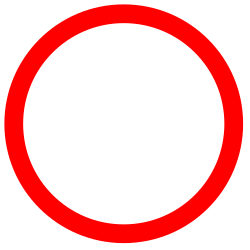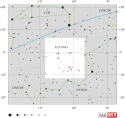LHS 292
| Stern LHS 292 | |||||||
|---|---|---|---|---|---|---|---|
| AladinLite | |||||||
| Beobachtungsdaten Äquinoktium: J2000.0, Epoche: J2000.0 | |||||||
| Sternbild | Sextant | ||||||
| Rektaszension | 10h 48m 12,61s [1] | ||||||
| Deklination | −11° 20′ 9,6″ [1] | ||||||
| Helligkeiten | |||||||
| Scheinbare Helligkeit | 15,78 ± 0,03 mag [1] | ||||||
| Helligkeit (J-Band) | 8,86 ± 0,02 mag [1] | ||||||
| G-Band-Magnitude | 12,84 ± 0,01 mag [1] | ||||||
| Spektrum und Indices | |||||||
| R−I-Index | 4,76 [1] | ||||||
| Spektralklasse | M6.5 V [1] | ||||||
| Astrometrie | |||||||
| Radialgeschwindigkeit | 2,18 ± 0,01 km/s [1] | ||||||
| Parallaxe | 219,33 ± 0,06 mas [1] | ||||||
| Entfernung | 14,86 ± 0,01 Lj 4,56 ± 0,01 pc | ||||||
| Visuelle Absolute Helligkeit Mvis | 17,50 mag [2] | ||||||
| Eigenbewegung [1] | |||||||
| Rek.-Anteil: | 579,02 ± 0,07 mas/a | ||||||
| Dekl.-Anteil: | −1530,08 ± 0,06 mas/a | ||||||
| Physikalische Eigenschaften | |||||||
| Masse | 0,08 M☉ [2] | ||||||
| Radius | 0,11 R☉ [3] | ||||||
| Leuchtkraft | |||||||
| Andere Bezeichnungen und Katalogeinträge | |||||||
| |||||||
LHS 292 ist ein Roter Zwerg im Sternbild Sextant. Mit einer scheinbaren Helligkeit von 15,8 mag ist er viel zu lichtschwach, um mit dem bloßen Auge gesehen werden zu können. Der Stern liegt mit 14,8 Lichtjahren relativ nah zu unserer Sonne. Er ist ein UV-Ceti-Stern[5], d. h. er kann plötzlich für kurze Zeit an Leuchtkraft gewinnen.
Einzelnachweise
- ↑ a b c d e f g h i LP 731-58. In: SIMBAD. Centre de Données astronomiques de Strasbourg, abgerufen am 3. Juni 2022.
- ↑ a b Cassy L. Davison, R. J. White, T. J. Henry, A. R. Riedel, W.-C. Jao, J. I. Bailey, S. N. Quinn, J. R. Cantrell, J. P. Subasavage, J. G. Winters: A 3D Search for Companions to 12 Nearby M Dwarfs. In: The Astronomical Journal. 149. Jahrgang, Nr. 3, 2015, S. 106, doi:10.1088/0004-6256/149/3/106, arxiv:1501.05012, bibcode:2015AJ....149..106D.
- ↑ J. Morin et al.: Large-scale magnetic topologies of late M dwarfs. In: Monthly Notices of the Royal Astronomical Society. 407. Jahrgang, Nr. 4, Oktober 2010, S. 2269–2286, doi:10.1111/j.1365-2966.2010.17101.x, arxiv:1005.5552, bibcode:2010MNRAS.407.2269M.
- ↑ Golimowski et al.: L' and M' Photometry of Ultracool Dwarfs. In: The Astrophysical Journal. 127. Jahrgang, Nr. 6, 2004, S. 3516–3536, doi:10.1086/420709, arxiv:astro-ph/0402475, bibcode:2004AJ....127.3516G.
- ↑ R. E. Gershberg, M. M. Katsova, M. N. Lovkaya, A. V. Terebizh, N. I. Shakhovskaya: Catalogue and bibliography of the UV Cet-type flare stars and related objects in the solar vicinity. In: Astronomy and Astrophysics Supplement. Band 139, S. 555–558, doi:10.1051/aas:1999407, bibcode:1999A&AS..139..555G.
Auf dieser Seite verwendete Medien
Opaque red circle
Autor/Urheber: IAU and Sky & Telescope magazine (Roger Sinnott & Rick Fienberg), Lizenz: CC BY 3.0
IAU Sextans chart


